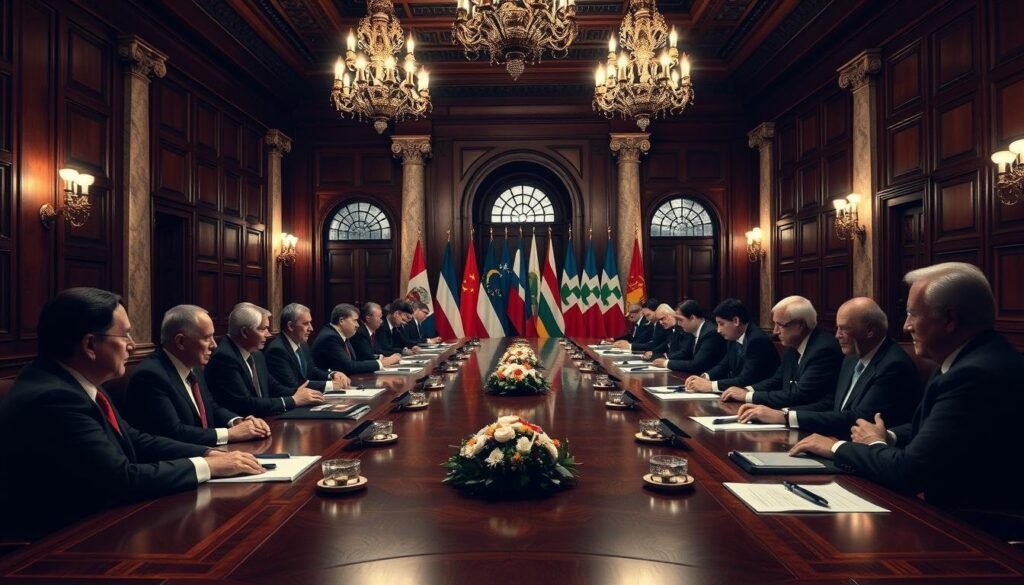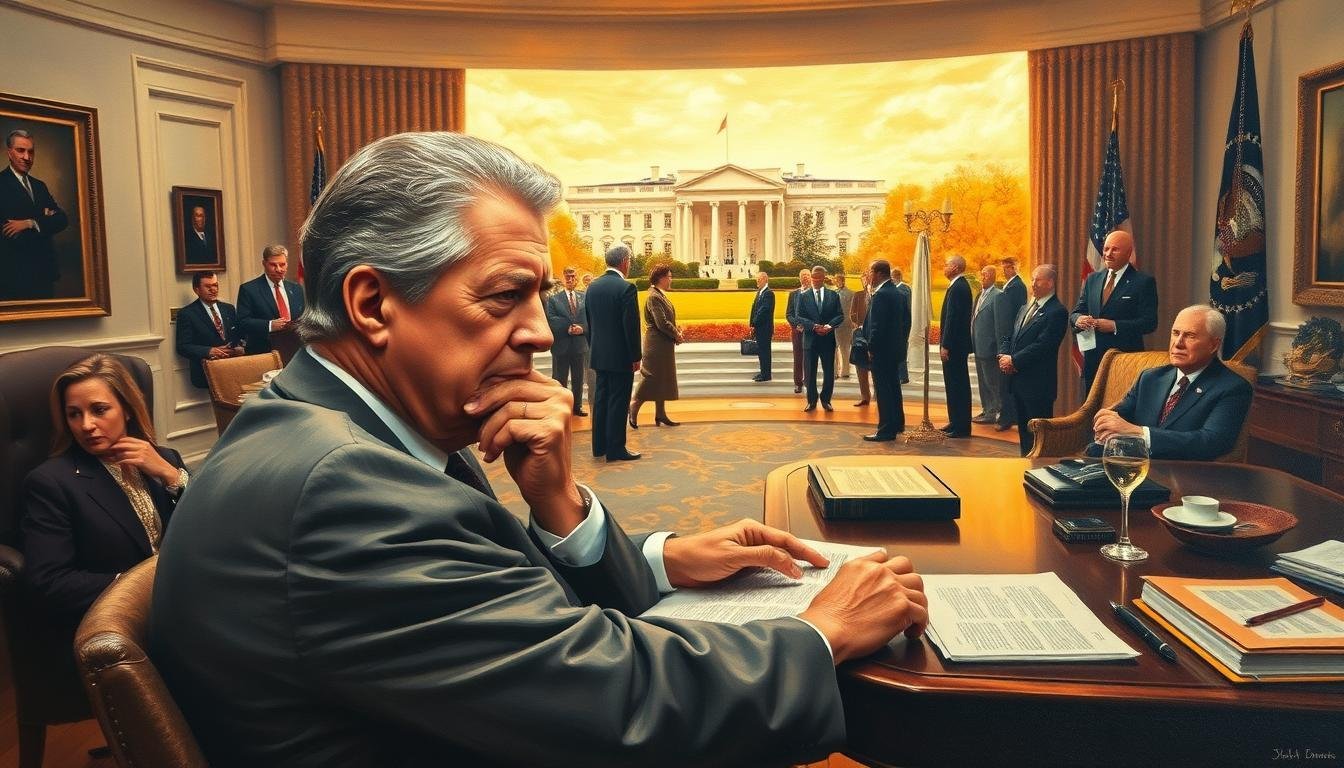Was Jimmy Carter a Good or Bad President? You might have heard different views on Carter’s presidency. As you dive into the details of his presidency, you’ll form your own opinion.
The evaluation of Carter’s presidency is complex. It includes both his achievements and the challenges he faced. This article will help you understand the key points of his term.
By looking at his successes and failures, you’ll get a better sense of his impact. As you continue reading, you’ll be able to decide if his presidency was a success or not.
Contents
- 1 The Historical Context of Carter’s Presidency
- 2 Carter’s Path to the White House
- 3 Domestic Policy Achievements and Failures
- 4 Foreign Policy Approach and Diplomatic Efforts
- 5 Major Crises That Defined Carter’s Presidency
- 6 Leadership Style and Public Communication
- 7 Was Jimmy Carter a Good or Bad President? A Balanced Assessment
- 8 Conclusion: Was Jimmy Carter a Good or Bad President?
- 9 FAQ
- 9.1 What were the major domestic policy initiatives during Jimmy Carter’s presidency?
- 9.2 How did Jimmy Carter’s foreign policy approach impact U.S. relations with other countries?
- 9.3 What were the major crises during Jimmy Carter’s presidency, and how did he respond to them?
- 9.4 How did Jimmy Carter’s leadership style influence his policy decisions and public perception?
- 9.5 What is Jimmy Carter’s legacy, and how has it endured beyond his presidency?
- 9.6 What were the key factors that contributed to Jimmy Carter’s victory in the 1976 presidential election?
- 9.7 How did the historical context of the late 1970s impact Jimmy Carter’s presidency?
The Historical Context of Carter’s Presidency
When Jimmy Carter became president, the country faced high inflation and an energy crisis. These issues were set against the backdrop of Cold War tensions. The late 1970s were tough for the U.S., with economic troubles and international tensions.
Global Politics and the Cold War Era
The Cold War was at its peak during Carter’s time in office. It greatly influenced U.S. foreign policy. The era was filled with military readiness and diplomatic efforts between the U.S. and the Soviet Union.
The economic problems of the late 1970s, like high inflation and an energy crisis, made Carter’s decisions harder. The energy crisis showed how vulnerable the country was to outside economic pressures.
| Challenge | Description | Impact on Carter’s Presidency |
|---|---|---|
| Economic Challenges | High inflation, energy crisis | Complicated policy decisions, affected public perception |
| Cold War Tensions | Heightened military preparedness, diplomatic tensions | Influenced foreign policy, led to significant diplomatic efforts |
Knowing about these historical challenges helps us understand Carter’s decisions and policies. It shows how the late 1970s affected his presidency.
Carter’s Path to the White House
Jimmy Carter’s journey to the White House started with a winning campaign. It was a time when people wanted honesty in politics after the Watergate scandal. Carter promised to bring back trust to the White House. His effective campaign strategies aimed to win back the public’s trust.
The 1976 election was a key moment for Carter. He won the Democratic nomination and then beat President Gerald Ford. Carter’s campaign resonated with people who wanted change and reform.
Carter connected with voters by being honest and trustworthy. This approach helped him win the 1976 election. It also prepared him for his presidency.
Domestic Policy Achievements and Failures
Carter’s presidency was marked by significant domestic policy efforts. He focused on energy and environmental protection. He also pushed for deregulation to boost economic growth by encouraging competition.
Social Policies: Human Rights and Environmental Efforts
Carter’s administration made human rights a key part of its policies. He worked to advance human rights through laws and public campaigns. His environmental policies were also ahead of their time, aiming at conservation and alternative energy.
The energy crisis was a major challenge Carter faced. He sought to cut down on foreign oil and promote saving energy. Creating the Department of Energy was a big step towards better energy management.
| Policy Area | Achievements | Challenges |
|---|---|---|
| Deregulation | Increased competition in industries | Potential for market instability |
| Energy Conservation | Reduced energy consumption | Initial resistance from industry |
| Human Rights | Enhanced global human rights advocacy | Criticism for inconsistent application |
Carter’s domestic policy had both successes and setbacks. His deregulation and energy efforts faced hurdles. Yet, his dedication to human rights and the environment had a lasting effect on U.S. policy.
Foreign Policy Approach and Diplomatic Efforts
Carter’s foreign policy was complex, with key efforts like the Camp David Accords and the Panama Canal Treaty. These initiatives showed his dedication to working with other countries.

The Camp David Accords were a major win for Carter. In 1978, he helped Israel and Egypt make peace. This showed Carter’s commitment to solving problems through talking.
Panama Canal Treaty and Relations with Latin America
The Panama Canal Treaty was signed in 1977. It gave the Panama Canal to Panama by 1999. This move helped improve ties with Latin America by fixing a big issue.
Carter also worked hard to improve human rights and talk to different countries. His policy mixed idealism with practicality. He aimed to protect American interests while helping the world.
Carter’s work, like the Camp David Accords and the Panama Canal Treaty, made a big impact. It showed how important talking and working together are for peace and cooperation.
Major Crises That Defined Carter’s Presidency
Jimmy Carter faced big challenges during his presidency. The Iran hostage crisis and the Soviet invasion of Afghanistan were two major ones. These crises tested his leadership and had a big impact on his presidency.
The Iran hostage crisis started in November 1979. Iranian students took 52 American diplomats and citizens hostage. This crisis lasted 444 days, ending in January 1981. It strained U.S.-Iran relations and hurt Carter’s approval ratings.
Carter took action when the Soviet Union invaded Afghanistan in December 1979. He imposed a grain embargo and boycotted the 1980 Summer Olympics in Moscow. These steps were to isolate the Soviet Union and push them out of Afghanistan.
| Crisis | Carter’s Response | Outcome |
|---|---|---|
| Iran Hostage Crisis | Diplomatic efforts, economic sanctions | Release of hostages after 444 days |
| Soviet Invasion of Afghanistan | Grain embargo, Olympic boycott | Soviet withdrawal in 1989 |
These crises showed the tough times Carter faced in foreign policy. His responses were seen as controversial. Yet, they showed his dedication to U.S. interests and global stability.
Leadership Style and Public Communication
Carter’s presidency was known for his focus on ethical leadership. He was dedicated to integrity and transparency. Carter believed in being open with the American people. He shared his thoughts and decisions through various media channels.
This way of public communication helped him connect with people personally. But, it also made some think he was weak or indecisive. His honesty was sometimes seen as a flaw.
Despite these issues, Carter’s values were a key part of his presidency.
Carter’s leadership style shaped his policy choices and how people saw his administration.
Was Jimmy Carter a Good or Bad President? A Balanced Assessment
Jimmy Carter’s presidency is complex and needs a balanced look. We must consider his policy wins and the tough times he faced. It’s important to judge his domestic and foreign policies against the late 1970s and early 1980s.
Carter worked hard to solve the energy crisis and fix the tax code. But, his time in office was also filled with high inflation and job losses. His foreign policy had bright spots, like the Camp David Accords. Yet, the Iran hostage crisis and the Soviet invasion of Afghanistan were big hurdles.
- Domestic Policy: Energy crisis initiatives, tax reform
- Foreign Policy: Camp David Accords, human rights advocacy
- Challenges: High inflation, Iran hostage crisis, Soviet invasion of Afghanistan
When looking at Carter’s presidency, we must see both the good and the bad. He showed great diplomatic talent but faced many crises. A fair evaluation will highlight his successes and the tough times, giving a full picture of his presidency.
Conclusion: Was Jimmy Carter a Good or Bad President?
Jimmy Carter’s presidency faced big challenges and made important achievements. His legacy goes beyond his time in office. It shows in his lasting impact on the world.
Carter’s work after leaving office shows his strong belief in human rights and democracy. Through The Carter Center, he has worked for peace and justice. His efforts have changed international relations and American politics.
Carter’s legacy is more than his presidency. It’s about his ongoing fight for democracy and human rights. His dedication inspires and influences global efforts.
See Also: Was Nixon a Good or Bad President?
FAQ
What were the major domestic policy initiatives during Jimmy Carter’s presidency?
Jimmy Carter focused on deregulation and managing the energy crisis. He also pushed for human rights and environmental protection. Some of these efforts were more successful than others.
How did Jimmy Carter’s foreign policy approach impact U.S. relations with other countries?
Carter’s diplomacy and human rights focus led to big wins. The Camp David Accords and the Panama Canal Treaty are examples. These showed his commitment to working with other nations.
What were the major crises during Jimmy Carter’s presidency, and how did he respond to them?
Carter faced big challenges like the Iran hostage crisis and the Soviet invasion of Afghanistan. He tried diplomacy and military actions. The results were mixed, affecting how people saw him.
How did Jimmy Carter’s leadership style influence his policy decisions and public perception?
Carter’s honesty and openness shaped his policies and how people viewed him. His way of talking to the public also played a big role in his presidency.
What is Jimmy Carter’s legacy, and how has it endured beyond his presidency?
Carter’s work after leaving office has made a big difference. Through The Carter Center, he continues to fight for human rights and democracy. His efforts have left a lasting mark on politics and international relations.
What were the key factors that contributed to Jimmy Carter’s victory in the 1976 presidential election?
Carter won in 1976 because of his campaign and his promise to clean up the White House after Watergate. His outsider status appealed to many voters.
How did the historical context of the late 1970s impact Jimmy Carter’s presidency?
The late 1970s were tough times, with high inflation and an energy crisis. The Cold War was also ongoing. These challenges made Carter’s job very hard.

Hi, I am Tatum Bradford from Washington. I have a background in political science and work as a senior revenue officer. I love learning about U.S. presidents and sharing interesting facts about political history.

